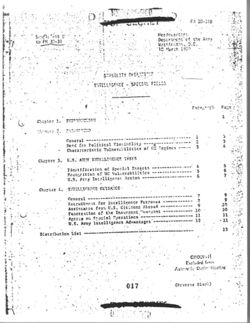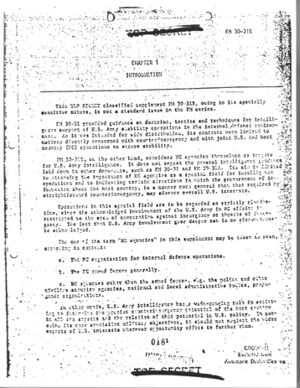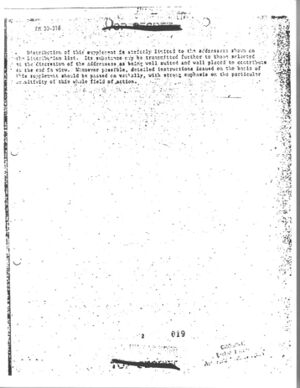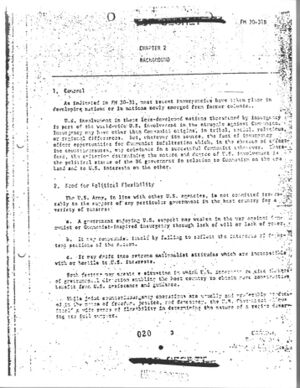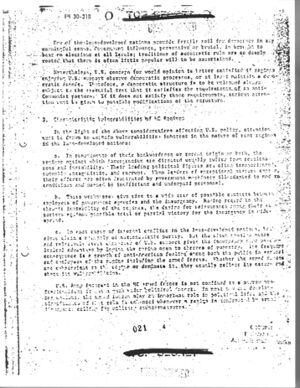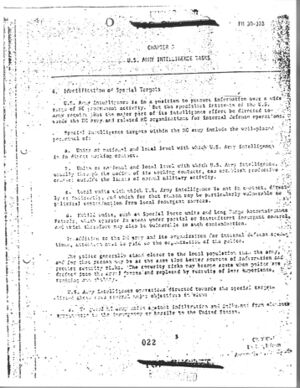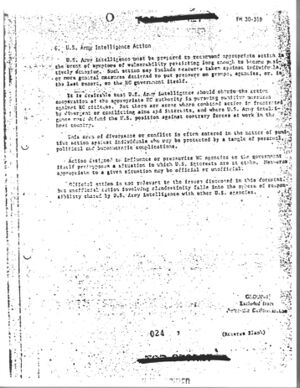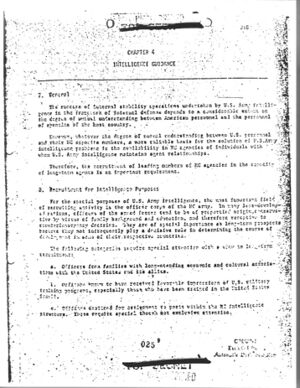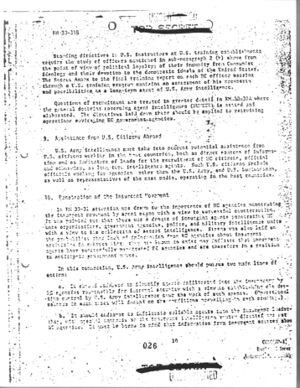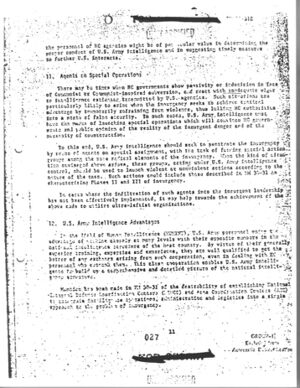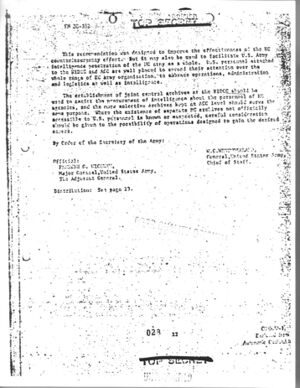Difference between revisions of "Document:Field Manual 30-31b"
(add screenshots of document) |
(description) |
||
| (7 intermediate revisions by the same user not shown) | |||
| Line 1: | Line 1: | ||
{{document | {{document | ||
| − | | | + | |description=An U.S. document describing top secret counterinsurgency tactics, including a "strategy of tension" involving violent attacks which are then blamed on radical left-wing groups in order to convince allied governments of the need for counter-action. It also points out the need for heavy recruiting among the officer corps and security forces in the host country. |
|image=PnvA6abXHiPtPEG7Xp-UCrPCE9w nM1ATfHNwlKVYALU8QyhgeiywJlcv25IsIakLV3FwS7LPawoCXzJvEb29huU0IvniN4aRKzmFNwLhgo.jpg | |image=PnvA6abXHiPtPEG7Xp-UCrPCE9w nM1ATfHNwlKVYALU8QyhgeiywJlcv25IsIakLV3FwS7LPawoCXzJvEb29huU0IvniN4aRKzmFNwLhgo.jpg | ||
| − | |subjects=Counterinsurgency,Gladio | + | |subjects=Counterinsurgency,Gladio,U.S. Army intelligence, asset recruitment,strategy of tension |
|type=Field Manual | |type=Field Manual | ||
|classification=Top Secret | |classification=Top Secret | ||
|declassified=Yes | |declassified=Yes | ||
|publication_date=10 March 1970 | |publication_date=10 March 1970 | ||
| + | |authors=Kenneth Wickham,William Westmoreland | ||
|source_URL=https://web.archive.org/web/20170423090655/http://jim-garrison.livejournal.com/37233.html | |source_URL=https://web.archive.org/web/20170423090655/http://jim-garrison.livejournal.com/37233.html | ||
| + | |note=HC is short for host country. The transcript is from the scanned file, and may vary slightly; some unclear words are marked as such [in brackets]. See [[Authenticity of Field Manual 30-31b]] for a discussion on authenticity. | ||
}} | }} | ||
[[image:Fm30-31b-18.jpg|thumb]] | [[image:Fm30-31b-18.jpg|thumb]] | ||
| Line 17: | Line 19: | ||
[[image:Fm30-31b-07-24.jpg|thumb]] | [[image:Fm30-31b-07-24.jpg|thumb]] | ||
[[image:Fm30-31b-25.jpg|thumb]] | [[image:Fm30-31b-25.jpg|thumb]] | ||
| + | [[image:Fm30-31b-26.jpg|thumb]] | ||
[[image:Fm30-31b-27.jpg|thumb]] | [[image:Fm30-31b-27.jpg|thumb]] | ||
[[image:Field Manual 30-31b last page.jpg|thumb]] | [[image:Field Manual 30-31b last page.jpg|thumb]] | ||
| Line 25: | Line 28: | ||
FM 30-31B | FM 30-31B | ||
| − | Supplement B | + | Supplement B to FM 30-31 |
| − | to FM 30-31 | ||
Headquarters | Headquarters | ||
| Line 32: | Line 34: | ||
Washington, D.C. | Washington, D.C. | ||
10 March 1970 | 10 March 1970 | ||
| − | |||
| − | |||
STABILITY OPERATIONS | STABILITY OPERATIONS | ||
| Line 39: | Line 39: | ||
INTELLIGENCE - SPECIAL FIELDS | INTELLIGENCE - SPECIAL FIELDS | ||
| − | + | ==CHAPTER 1 INTRODUCTION== | |
| − | |||
| − | |||
| − | |||
| − | |||
| − | |||
| − | |||
| − | |||
| − | |||
| − | |||
| − | |||
| − | |||
| − | |||
| − | |||
| − | |||
| − | |||
| − | |||
| − | |||
| − | |||
| − | |||
| − | |||
| − | |||
| − | |||
| − | |||
| − | |||
| − | |||
| − | |||
| − | |||
| − | |||
| − | |||
| − | |||
| − | |||
| − | |||
| − | |||
| − | |||
| − | |||
| − | |||
| − | CHAPTER 1 | ||
| − | |||
| − | INTRODUCTION | ||
| − | |||
| − | |||
| − | |||
This TOP SECRET classified supplement FM 30-31B, owing to its specially sensitive nature, is not a standard issue in the FM series. | This TOP SECRET classified supplement FM 30-31B, owing to its specially sensitive nature, is not a standard issue in the FM series. | ||
| − | FM 30-31 provide guidance on doctrine, tactics and techniques for intelligence support of U.S. Army stability operations in the internal defensive environment. As it was intended for wide distribution, its contents were limited to matters directly concerned with counterinsurgency and with joint U.S. and host country (HC) operations to secure stability. | + | FM 30-31 provide guidance on doctrine, [[tactics]] and techniques for intelligence support of U.S. Army stability operations in the internal defensive environment. As it was intended for wide distribution, its contents were limited to matters directly concerned with [[counterinsurgency]] and with joint U.S. and host country (HC) operations to secure stability. |
FM 30-31B, on the other hand, considers HC agencies themselves as targets for U.S. Army intelligence. It does not repeat the general intelligence guidance laid down in other documents, such as FM 30-31 and FM 30-31A. Its aim is limited to stressing the importance of HC agencies as a special field for intelligence operations and to indicating certain directions in which the procurement of information about the host country, in a manner more general than that required by straightforward counterinsurgency, may advance overall U.S. interests. | FM 30-31B, on the other hand, considers HC agencies themselves as targets for U.S. Army intelligence. It does not repeat the general intelligence guidance laid down in other documents, such as FM 30-31 and FM 30-31A. Its aim is limited to stressing the importance of HC agencies as a special field for intelligence operations and to indicating certain directions in which the procurement of information about the host country, in a manner more general than that required by straightforward counterinsurgency, may advance overall U.S. interests. | ||
| Line 92: | Line 50: | ||
The use of the term "HC agencies" in this supplement may be taken to mean, according to context: | The use of the term "HC agencies" in this supplement may be taken to mean, according to context: | ||
| − | + | a. The HC organization for internal defense operations.<br> | |
| − | + | b. The HC armed forces generally.<br> | |
| − | + | c. HC agencies other than the armed forces, e.g. the police and other civilian security agencies, national and local administrative bodies, propaganda organizations.<br> | |
| − | In other words, U.S. Army intelligence has a wide ranging role in assisting to determine the | + | In other words, [[U.S. Army intelligence]] has a wide ranging role in assisting to determine the [precise] counterinsurgency potential of the host country in all its aspects and the relation of that potential to U.S. policy. In pursuing its more specialist military objectives, it should not neglect the wider aspects of U.S. interests wherever opportunity offers to further them. |
Distribution of this supplement is strictly limited to the addresses shown on the Distribution list. Its substance may be transmitted further to those selected in the discretion of the addressees as being well suited and well place to contribute to the end in view. Whenever possible, detailed instructions issued on the basis of this supplement should be passed on verbally, with strong emphasis on the particular sensitivity of this whole field of action. | Distribution of this supplement is strictly limited to the addresses shown on the Distribution list. Its substance may be transmitted further to those selected in the discretion of the addressees as being well suited and well place to contribute to the end in view. Whenever possible, detailed instructions issued on the basis of this supplement should be passed on verbally, with strong emphasis on the particular sensitivity of this whole field of action. | ||
| − | CHAPTER 2 | + | ==CHAPTER 2 BACKGROUND== |
| − | + | ===1. General=== | |
| − | BACKGROUND | + | As indicated in FM 30-31, most recent insurgencies have taken place in [[developing nations]] or in nations newly emerged from former [[colonies]]. |
| − | |||
| − | |||
| − | |||
| − | 1. General | ||
| − | |||
| − | As indicated in FM 30-31, most recent insurgencies have taken place in developing nations or in nations newly emerged from former colonies | ||
| − | |||
| − | |||
| − | + | U.S. involvement in these less-developed nations threatened by insurgency is part of the world-wide involvement in the struggle against [[Communism]]. Insurgency may have other than Communist origins, in [[tribal]], social, religious, or regional differences. But, whatever its source, the fact of insurgency offers opportunities for Communist infiltration which, in the absence of effective countermeasures, may culminate in a successful Communist take-over. Therefore, the criterion determining the nature and degree of U.S. involvement in the political stance of the HC government in relation to Communism on the one hand and to U.S. interests on the other. | |
| + | ===2. Need for Political Flexibility=== | ||
The U.s. Army, in line with other U.S. agencies, is not committed irrevocably to the support of any particular government in the host country for a variety of reasons: | The U.s. Army, in line with other U.S. agencies, is not committed irrevocably to the support of any particular government in the host country for a variety of reasons: | ||
| − | + | a. A government enjoying U.S. support may weaken in the war against Communist or Communist-inspired insurgency through lack of will or lack of power.<br> | |
| − | |||
| − | |||
| − | + | b. It may compromise itself by failing to reflect the interests of important sections of the nation.<br> | |
| − | + | c. It may drift into extreme [[nationalist]] attitudes which are incompatible with or hostile to U.S. interests.<br> | |
| − | + | Such factors may create a situation in which U.S. interests [necessitates changes] of governmental direction enabling the host country to obtain more constructive benefit from U.S. assistance and guidance. | |
| − | + | While joint counterinsurgency operations are usually and preferably conducted in the names of [[freedom]], [[justice]], and [[democracy]], the U.S. government allows itself a wide range of flexibility in determining the nature of a [[regime]] deserving its full support. | |
| − | + | Few of the less-developed nations provide fertile soil for [[democracy]] in any meaningful sense. Government influence, persuasive and brutal, is brought to bear on elections at all levels; traditions of autocratic rule are so deeply rooted that there is often little popular will to be ascertained. | |
| − | + | Nevertheless, U.S. concern for [[world opinion]] is better satisfied if regimes enjoying U.S. support observe democratic processes, or at least maintain a democratic facade. Therefore, a democratic structure is to be welcomed always subject to the eventual test that it satisfies the requirements of an [[anti-Communist]] posture. It it does not satisfy these requirements, serious attention must be given to possible modification to the structure. | |
| + | ===3. Characteristic Vulnerabilities of HC Regimes=== | ||
In the light of the above considerations affecting U.S. policy, attention must be drawn to certain vulnerabilities inherent in the nature of most regimes in the less-developed nations. | In the light of the above considerations affecting U.S. policy, attention must be drawn to certain vulnerabilities inherent in the nature of most regimes in the less-developed nations. | ||
| − | + | a. In consequence of their backwardness or recent origin or both, the regimes against which insurgencies are directed usually suffer from restlessness and instability. Their leading political figures are often inexperienced, mutually antagonistic, and corrupt. When leaders of exceptional stature emerge, their efforts are often frustrated by government machinery ill-adapted to modern conditions and manned by inefficient and underpaid personnel.<br> | |
| − | + | b. These weaknesses give rise to a wide area of possible contacts between employees of government agencies and the insurgency. Having regard to the chronic instability of the regimes, the desire for reinsurances among their supporters against possible total or partial victory for the insurgency is widespread.<br> | |
| − | + | c. In most cases of internal conflict in the less-developed nations, both sides claim a monopoly of nationalistic purity. But the often unstable state and relatively overt character of U.S. support gives the insurgency some psychological advantage by laying the regime open to charges of puppetry. The frequent consequence is a growth of [[anti-American feeling]] among both the public and in general and among employees of the regime including the armed forces. Whether the armed forces are subservient to the regime or dominate it, they usually reflect its nature and share its vulnerabilities.<br> | |
| − | U.S. Army interest in the HC armed forces is not confined to a narrow professionalism: is | + | U.S. Army interest in the HC armed forces is not confined to a narrow professionalism: is [has a much wider political impact]. In most new and developing nations the armed forces play an important role in political life, and the [significance] of that role is changed whenever a regime is confronted by armed [insurgency] calling for military countermeasures. |
| − | CHAPTER 3 | + | ==CHAPTER 3 U.S. ARMY INTELLIGENCE TASKS== |
| − | + | ===4. Identification of Special Targets=== | |
| − | |||
| − | |||
| − | |||
| − | 4. Identification of Special Targets | ||
U.S. Army intelligence is in a position to procure information over a wide range of HC government activity. But the specialist interests of the U.S. Army require that the major part of its intelligence effort be directed towards the HC army and related HC organizations for internal defense operations. | U.S. Army intelligence is in a position to procure information over a wide range of HC government activity. But the specialist interests of the U.S. Army require that the major part of its intelligence effort be directed towards the HC army and related HC organizations for internal defense operations. | ||
| Line 156: | Line 102: | ||
Special intelligence targets within the HC army include the well-placed personnel of: | Special intelligence targets within the HC army include the well-placed personnel of: | ||
| − | + | a. Units at national and local level with which U.S. Army intelligence is in direct working contact.<br> | |
| − | + | b. Units at regional and local level with which U.A. Army intelligence, usually through the medium of its working contacts, can establish productive contact outside the limits of normal military activity.<br> | |
| − | + | c. Local units with which U.S. Army intelligence is no in contact, directly or indirectly, and which for that reason may be particularly vulnerable to political contamination from local insurgent sources.<br> | |
| − | + | d. Mobile units, such as Special Force units and Long Range Reconnaissance Patrols, which operate in areas under partial or intermittent control, and which therefore may also be vulnerable to such contamination.<br> | |
| − | In addition, to the HC army and its organization for internal defense operations, attention must be paid to the organization of the police. | + | In addition, to the HC army and its organization for internal defense operations, attention must be paid to the organization of the [[police]]. |
The police generally stand closer to the local population than the army, and for that reason may be at the same time better sources of information and greater security risks. The security risks may become acute when police are drafted into the armed forces and replaced by recruits of less experience, training and ability. | The police generally stand closer to the local population than the army, and for that reason may be at the same time better sources of information and greater security risks. The security risks may become acute when police are drafted into the armed forces and replaced by recruits of less experience, training and ability. | ||
| Line 170: | Line 116: | ||
U.S. Army intelligence operations directed towards the special targets listed above have several major objectives in view: | U.S. Army intelligence operations directed towards the special targets listed above have several major objectives in view: | ||
| − | + | a. To guard HC army units against infiltration and influence from elements sympathetic to the insurgency or hostile to the United States.<br> | |
| − | + | b. To guard against the possibility of HC army personnel reinsuring their own future by developing active or passive contact with the insurgency.<br> | |
| − | + | c. To reduce [[corruption]] and inefficiency within HC army units to tolerable levels.<br> | |
| − | + | d. To assist in the promotion of HC officers known to be loyal to the United States.<br> | |
| − | + | e. To extend some forms of protection to all HC agencies falling within the filed of U.s. Army intelligence operations.<br> | |
The achievement of these objectives calls for the timely recognition of vulnerabilities in HC agencies and for timely counteraction by U.S. Army intelligence. | The achievement of these objectives calls for the timely recognition of vulnerabilities in HC agencies and for timely counteraction by U.S. Army intelligence. | ||
| − | 5. Recognition of Vulnerabilities | + | ===5. Recognition of Vulnerabilities=== |
The symptoms of vulnerability among HC agencies calling for investigation, identification and action by U.S. Army intelligence include: | The symptoms of vulnerability among HC agencies calling for investigation, identification and action by U.S. Army intelligence include: | ||
| − | + | a. Political instability, such as lukewarm attitudes towards the regime, sympathy with the insurgency, outright collaboration with the insurgency.<br> | |
| − | + | b. [[Anti-Americanism]] arising from exposure to insurgent [[propaganda]], from friction between employees of HC and U.S. organizations at the personal or working level or from the too obvious presence of American personnel in the role of senior partners.<br> | |
| − | + | c. Blood relationships linking employees of the HC government with the insurgency. It is common practice for a family to deliberately to split its loyalties between the regime and the insurgency, so that whichever wins ultimately the family will have a foot in the right camp. Blood ties are of special relevance to police units, members of which often serve in their own home districts and are therefore exposed to pressure from families and friends.<br> | |
| − | + | d. Corruption, which exposes the individual to pressure from insurgent elements and, when it becomes general, undermines popular confidence in the regime, thus encouraging the spread of insurgency.<br> | |
| − | + | e. Inefficiency reaching a level at which it impedes the smooth flow of [operations] and thus constitutes a form of direct assistance to the [enemy]. It may also [create sympathy for] the insurgency: it is a well-tried form of [[administrative sabotage]], being relatively easy to practice and relatively difficult to detect and identify as such.<br> | |
| − | 6. U.S. Army Intelligence Action | + | ===6. U.S. Army Intelligence Action=== |
U.S. Army intelligence must be prepared to recommend appropriate action in the event of symptoms of vulnerability persisting long enough to become positively damaging. Such action may include measures taken against individuals, or more general measures designed to put pressure on groups, agencies, or, in the last resort, on the HC government itself. | U.S. Army intelligence must be prepared to recommend appropriate action in the event of symptoms of vulnerability persisting long enough to become positively damaging. Such action may include measures taken against individuals, or more general measures designed to put pressure on groups, agencies, or, in the last resort, on the HC government itself. | ||
| Line 208: | Line 154: | ||
Official action is not relevant to the issues discussed in this document. But unofficial action involving clandestinity falls into the sphere of responsibility shared by U.S. Army intelligence with other U.S. agencies. | Official action is not relevant to the issues discussed in this document. But unofficial action involving clandestinity falls into the sphere of responsibility shared by U.S. Army intelligence with other U.S. agencies. | ||
| − | CHAPTER 4 | + | ==CHAPTER 4 INTELLIGENCE GUIDANCE== |
| − | |||
| − | INTELLIGENCE GUIDANCE | ||
| − | |||
| − | |||
| − | 7. General | + | ===7. General=== |
The success of internal stability operations undertaken by U.S. Army intelligence in the framework of internal defense depends to a considerable extent on the degree of mutual understanding between American personnel and the personnel of agencies of the host country. | The success of internal stability operations undertaken by U.S. Army intelligence in the framework of internal defense depends to a considerable extent on the degree of mutual understanding between American personnel and the personnel of agencies of the host country. | ||
| Line 222: | Line 164: | ||
Therefore, the recruitment of leading members of HC agencies in the capacity of long-term agents is an important requirement. | Therefore, the recruitment of leading members of HC agencies in the capacity of long-term agents is an important requirement. | ||
| − | 8. Recruitment for Intelligence Purposes | + | ===8. Recruitment for Intelligence Purposes=== |
For the special purposes of U.S. Army intelligence, the most important field of recruiting activity is the officer corps of the HC army. In many less-developed nations, officers of the armed forces tend to be of propertied origin, conservative by virtue of family background and education, and therefore receptive to counterinsurgency doctrine. They are of special importance as long-term prospects because they not infrequently play a decisive role in determining the course of development in some of their respective countries. | For the special purposes of U.S. Army intelligence, the most important field of recruiting activity is the officer corps of the HC army. In many less-developed nations, officers of the armed forces tend to be of propertied origin, conservative by virtue of family background and education, and therefore receptive to counterinsurgency doctrine. They are of special importance as long-term prospects because they not infrequently play a decisive role in determining the course of development in some of their respective countries. | ||
| Line 228: | Line 170: | ||
The following categories require special attention with a view to long-term recruitment: | The following categories require special attention with a view to long-term recruitment: | ||
| − | + | a. Officers from families of long-standing economic and cultural association with the United States and its allies.<br> | |
| − | + | b. Officers known to have received favorable impressions of [[U.S. military training programs]], especially those who have been trained in the [[United States]] itself.<br> | |
| − | + | c. Officers destined for assignment to posts within the HC intelligence structure. These require special though not exclusive attention.<br> | |
Standing directives to U.S. instructors at U.S. training establishments require the study of officers mentioned in sub-paragraph 2 (b) above from the point of view of political loyalty: of their immunity from Communist ideology and their devotion to the democratic ideals of the United States. The Secret Annex to the final training report on each HC officer passing through a U.S. training program contains an assessment of his prospects and possibilities as a long-term agent of U.S. Army intelligence. | Standing directives to U.S. instructors at U.S. training establishments require the study of officers mentioned in sub-paragraph 2 (b) above from the point of view of political loyalty: of their immunity from Communist ideology and their devotion to the democratic ideals of the United States. The Secret Annex to the final training report on each HC officer passing through a U.S. training program contains an assessment of his prospects and possibilities as a long-term agent of U.S. Army intelligence. | ||
| Line 238: | Line 180: | ||
Questions of recruitment are treated in greater detail in FM 30-31A where the general doctrine governing agent intelligence (HUMINT) is stated and elaborated. The directive laid down there should be applied to recruiting operations envisaging HC government agencies. | Questions of recruitment are treated in greater detail in FM 30-31A where the general doctrine governing agent intelligence (HUMINT) is stated and elaborated. The directive laid down there should be applied to recruiting operations envisaging HC government agencies. | ||
| − | 9. Assistance from U.S. Citizens Abroad | + | ===9. Assistance from U.S. Citizens Abroad=== |
U.S. Army intelligence must take into account potential assistance from U.S. citizens working in the host countries, both as direct sources of information and as indicators of leads for the recruitment of HC citizens, official and otherwise, as long-term intelligence agents. Such U.S. citizens include officials working for agencies other than the U.S. Army, and U.S. businessmen, as well as representatives of the mass media, operating in the host countries. | U.S. Army intelligence must take into account potential assistance from U.S. citizens working in the host countries, both as direct sources of information and as indicators of leads for the recruitment of HC citizens, official and otherwise, as long-term intelligence agents. Such U.S. citizens include officials working for agencies other than the U.S. Army, and U.S. businessmen, as well as representatives of the mass media, operating in the host countries. | ||
| − | 10. Penetration of the Insurgent Movement | + | ===10. Penetration of the Insurgent Movement=== |
In FM 30-31 attention was drawn to the importance of HC agencies penetrating the insurgent movement by agent means with a view to successful counteraction. It was pointed out that there was a danger of insurgent agents penetrating HC mass organizations, government agencies, police, and military intelligence units with a view to the collection of secret intelligence. Stress was also laid on the probability that lack of information from HC agencies about insurgent activities in spheres where they are known to exist may indicate that insurgent agents have successfully penetrated HC agencies and are therefore in a position to anticipate government moves. | In FM 30-31 attention was drawn to the importance of HC agencies penetrating the insurgent movement by agent means with a view to successful counteraction. It was pointed out that there was a danger of insurgent agents penetrating HC mass organizations, government agencies, police, and military intelligence units with a view to the collection of secret intelligence. Stress was also laid on the probability that lack of information from HC agencies about insurgent activities in spheres where they are known to exist may indicate that insurgent agents have successfully penetrated HC agencies and are therefore in a position to anticipate government moves. | ||
| − | In this connection, U.S. Army intelligence should pursue two main lines of action: | + | In this connection, [[U.S. Army intelligence]] should pursue two main lines of action: |
| − | + | a. It should endeavor to identify agents infiltrated into the insurgency by HC agencies responsible for internal security with a view to establishing clandestine control by U.S. Army intelligence over the work of such agents. (Operational [methods] in such cases will [depend on] on the conditions prevailing in each country.)<br> | |
| − | + | b. It should endeavor to infiltrate reliable agents into the insurgent leadership, with special [interests on] the insurgent intelligence system directed against HC agencies. It must be borne in mind that information from insurgent sources about the personnel of HC agencies might be of particular value in determining the proper conduct of U.S. Army intelligence and in suggesting timely measures to further U.S. interests.<br> | |
| − | 11. Agents on Special Operations | + | ===11. Agents on Special Operations=== |
There may be times when HC governments show passivity or indecision in face of Communist or Communist-inspired subversion, and react with inadequate vigor to intelligence estimates transmitted by U.S. agencies. Such situations are particularly likely to arise when the insurgency seeks to achieve tactical advantage by temporarily refraining from violence, thus lulling HC authorities into a state of false security. In such cases, U.S. Army intelligence must have the means of launching special operations which will convince HC governments and public opinion of the reality of the insurgent danger and of the necessity of counteraction. | There may be times when HC governments show passivity or indecision in face of Communist or Communist-inspired subversion, and react with inadequate vigor to intelligence estimates transmitted by U.S. agencies. Such situations are particularly likely to arise when the insurgency seeks to achieve tactical advantage by temporarily refraining from violence, thus lulling HC authorities into a state of false security. In such cases, U.S. Army intelligence must have the means of launching special operations which will convince HC governments and public opinion of the reality of the insurgent danger and of the necessity of counteraction. | ||
| Line 260: | Line 202: | ||
In cases where the infiltration of such agents into insurgent leadership has not been effectively implemented, it may help towards the achievement of the above ends to utilize ultra-leftist organizations. | In cases where the infiltration of such agents into insurgent leadership has not been effectively implemented, it may help towards the achievement of the above ends to utilize ultra-leftist organizations. | ||
| − | 12. U.S. Army Intelligence Advantages | + | ===12. U.S. Army Intelligence Advantages=== |
| − | In the field of Human Intelligence (HUMINT) U.S. Army personnel enjoy the advantage of working closely at many levels with their opposite numbers in the national intelligence structure of the host country. By virtue of their generally superior training, expertise and experience, they are well qualified to get the better of any exchange arising from such cooperation, even in dealing with HC personnel who outrank them. This close cooperation enables U.S. Army intelligence to build up a comprehensive and detailed picture of the national intelligence structure. | + | In the field of [[Human Intelligence]] (HUMINT) U.S. Army personnel enjoy the advantage of working closely at many levels with their opposite numbers in the national intelligence structure of the host country. By virtue of their generally superior training, expertise and experience, they are well qualified to get the better of any exchange arising from such cooperation, even in dealing with HC personnel who outrank them. This close cooperation enables U.S. Army intelligence to build up a comprehensive and detailed picture of the national intelligence structure. |
Mention has been made in FM 30-31 of the desirability of establishing National Internal Defense Coordination Centers (NIDCC) and Area Coordinations Centers (ACC) to integrate intelligence operations, administration and logistics into a single approach to the problem of insurgency. | Mention has been made in FM 30-31 of the desirability of establishing National Internal Defense Coordination Centers (NIDCC) and Area Coordinations Centers (ACC) to integrate intelligence operations, administration and logistics into a single approach to the problem of insurgency. | ||
| − | This recommendation was designed to improve the effectiveness of the HC counterinsurgency effort. But it may also be used to facilitate U.S. Army intelligence penetration of the HC army as a whole. U.S. personnel attached to the NIDCC and ACC are well placed to spread their attention over the whole range of HC army organization, to embrace operations, administration and logistics as well as intelligence. | + | This recommendation was designed to improve the effectiveness of the HC counterinsurgency effort. But it may also be used to facilitate U.S. Army intelligence penetration of the HC army as a whole. U.S. personnel attached to the [[NIDCC]] and ACC are well placed to spread their attention over the whole range of HC army organization, to embrace operations, administration and logistics as well as intelligence. |
| − | The establishment of joint central archives at the NIDCC should be used to assist the procurement of intelligence about the personnel of HC agencies, and the more selective archives kept at ACC level should serve the same purpose. Where the existence of separate HC archives are not officially accessible to U.S. personnel is known or suspected, careful consideration should be given to the possibility of operations designed to gain the desired assets. | + | The establishment of joint central archives at the [[NIDCC]] should be used to assist the procurement of intelligence about the personnel of HC agencies, and the more selective archives kept at ACC level should serve the same purpose. Where the existence of separate HC archives are not officially accessible to U.S. personnel is known or suspected, careful consideration should be given to the possibility of operations designed to gain the desired assets. |
By Order of the Secretary of the Army: | By Order of the Secretary of the Army: | ||
| − | + | [[William Westmoreland|W.C. WESTMORELAND]]<br> | |
| − | + | General, United States Army<br> | |
| − | + | Chief of Staff<br> | |
Official: | Official: | ||
| − | KENNETH G. WICKHAM, | + | [[Kenneth Wickham|KENNETH G. WICKHAM]],<br> |
| − | Major General, United States Army, | + | Major General, United States Army,<br> |
| − | The Adjutant General. | + | The Adjutant General.<br> |
Distribution: See page 13. [Not provided] | Distribution: See page 13. [Not provided] | ||
Latest revision as of 10:12, 27 April 2024
| An U.S. document describing top secret counterinsurgency tactics, including a "strategy of tension" involving violent attacks which are then blamed on radical left-wing groups in order to convince allied governments of the need for counter-action. It also points out the need for heavy recruiting among the officer corps and security forces in the host country. |
Subjects: Counterinsurgency, Gladio, U.S. Army intelligence, asset recruitment, strategy of tension
Security Classification: Top Secret (declassified )
Source: Link
HC is short for host country. The transcript is from the scanned file, and may vary slightly; some unclear words are marked as such [in brackets]. See Authenticity of Field Manual 30-31b for a discussion on authenticity.
★ Start a Discussion about this document
UNCLASSIFIED
TOP SECRET
FM 30-31B
Supplement B to FM 30-31
Headquarters Department of the Army Washington, D.C. 10 March 1970
STABILITY OPERATIONS
INTELLIGENCE - SPECIAL FIELDS
Contents
CHAPTER 1 INTRODUCTION
This TOP SECRET classified supplement FM 30-31B, owing to its specially sensitive nature, is not a standard issue in the FM series.
FM 30-31 provide guidance on doctrine, tactics and techniques for intelligence support of U.S. Army stability operations in the internal defensive environment. As it was intended for wide distribution, its contents were limited to matters directly concerned with counterinsurgency and with joint U.S. and host country (HC) operations to secure stability.
FM 30-31B, on the other hand, considers HC agencies themselves as targets for U.S. Army intelligence. It does not repeat the general intelligence guidance laid down in other documents, such as FM 30-31 and FM 30-31A. Its aim is limited to stressing the importance of HC agencies as a special field for intelligence operations and to indicating certain directions in which the procurement of information about the host country, in a manner more general than that required by straightforward counterinsurgency, may advance overall U.S. interests.
Operations in this special field are to be regarded as strictly clandestine, since the acknowledged involvement of the U.S. Army in HC affairs is restricted to the area of cooperation against insurgency or threats of insurgency. The fact that U.S. Army involvement goes deeper can in no circumstances be acknowledged.
The use of the term "HC agencies" in this supplement may be taken to mean, according to context:
a. The HC organization for internal defense operations.
b. The HC armed forces generally.
c. HC agencies other than the armed forces, e.g. the police and other civilian security agencies, national and local administrative bodies, propaganda organizations.
In other words, U.S. Army intelligence has a wide ranging role in assisting to determine the [precise] counterinsurgency potential of the host country in all its aspects and the relation of that potential to U.S. policy. In pursuing its more specialist military objectives, it should not neglect the wider aspects of U.S. interests wherever opportunity offers to further them.
Distribution of this supplement is strictly limited to the addresses shown on the Distribution list. Its substance may be transmitted further to those selected in the discretion of the addressees as being well suited and well place to contribute to the end in view. Whenever possible, detailed instructions issued on the basis of this supplement should be passed on verbally, with strong emphasis on the particular sensitivity of this whole field of action.
CHAPTER 2 BACKGROUND
1. General
As indicated in FM 30-31, most recent insurgencies have taken place in developing nations or in nations newly emerged from former colonies.
U.S. involvement in these less-developed nations threatened by insurgency is part of the world-wide involvement in the struggle against Communism. Insurgency may have other than Communist origins, in tribal, social, religious, or regional differences. But, whatever its source, the fact of insurgency offers opportunities for Communist infiltration which, in the absence of effective countermeasures, may culminate in a successful Communist take-over. Therefore, the criterion determining the nature and degree of U.S. involvement in the political stance of the HC government in relation to Communism on the one hand and to U.S. interests on the other.
2. Need for Political Flexibility
The U.s. Army, in line with other U.S. agencies, is not committed irrevocably to the support of any particular government in the host country for a variety of reasons:
a. A government enjoying U.S. support may weaken in the war against Communist or Communist-inspired insurgency through lack of will or lack of power.
b. It may compromise itself by failing to reflect the interests of important sections of the nation.
c. It may drift into extreme nationalist attitudes which are incompatible with or hostile to U.S. interests.
Such factors may create a situation in which U.S. interests [necessitates changes] of governmental direction enabling the host country to obtain more constructive benefit from U.S. assistance and guidance.
While joint counterinsurgency operations are usually and preferably conducted in the names of freedom, justice, and democracy, the U.S. government allows itself a wide range of flexibility in determining the nature of a regime deserving its full support.
Few of the less-developed nations provide fertile soil for democracy in any meaningful sense. Government influence, persuasive and brutal, is brought to bear on elections at all levels; traditions of autocratic rule are so deeply rooted that there is often little popular will to be ascertained.
Nevertheless, U.S. concern for world opinion is better satisfied if regimes enjoying U.S. support observe democratic processes, or at least maintain a democratic facade. Therefore, a democratic structure is to be welcomed always subject to the eventual test that it satisfies the requirements of an anti-Communist posture. It it does not satisfy these requirements, serious attention must be given to possible modification to the structure.
3. Characteristic Vulnerabilities of HC Regimes
In the light of the above considerations affecting U.S. policy, attention must be drawn to certain vulnerabilities inherent in the nature of most regimes in the less-developed nations.
a. In consequence of their backwardness or recent origin or both, the regimes against which insurgencies are directed usually suffer from restlessness and instability. Their leading political figures are often inexperienced, mutually antagonistic, and corrupt. When leaders of exceptional stature emerge, their efforts are often frustrated by government machinery ill-adapted to modern conditions and manned by inefficient and underpaid personnel.
b. These weaknesses give rise to a wide area of possible contacts between employees of government agencies and the insurgency. Having regard to the chronic instability of the regimes, the desire for reinsurances among their supporters against possible total or partial victory for the insurgency is widespread.
c. In most cases of internal conflict in the less-developed nations, both sides claim a monopoly of nationalistic purity. But the often unstable state and relatively overt character of U.S. support gives the insurgency some psychological advantage by laying the regime open to charges of puppetry. The frequent consequence is a growth of anti-American feeling among both the public and in general and among employees of the regime including the armed forces. Whether the armed forces are subservient to the regime or dominate it, they usually reflect its nature and share its vulnerabilities.
U.S. Army interest in the HC armed forces is not confined to a narrow professionalism: is [has a much wider political impact]. In most new and developing nations the armed forces play an important role in political life, and the [significance] of that role is changed whenever a regime is confronted by armed [insurgency] calling for military countermeasures.
CHAPTER 3 U.S. ARMY INTELLIGENCE TASKS
4. Identification of Special Targets
U.S. Army intelligence is in a position to procure information over a wide range of HC government activity. But the specialist interests of the U.S. Army require that the major part of its intelligence effort be directed towards the HC army and related HC organizations for internal defense operations.
Special intelligence targets within the HC army include the well-placed personnel of:
a. Units at national and local level with which U.S. Army intelligence is in direct working contact.
b. Units at regional and local level with which U.A. Army intelligence, usually through the medium of its working contacts, can establish productive contact outside the limits of normal military activity.
c. Local units with which U.S. Army intelligence is no in contact, directly or indirectly, and which for that reason may be particularly vulnerable to political contamination from local insurgent sources.
d. Mobile units, such as Special Force units and Long Range Reconnaissance Patrols, which operate in areas under partial or intermittent control, and which therefore may also be vulnerable to such contamination.
In addition, to the HC army and its organization for internal defense operations, attention must be paid to the organization of the police.
The police generally stand closer to the local population than the army, and for that reason may be at the same time better sources of information and greater security risks. The security risks may become acute when police are drafted into the armed forces and replaced by recruits of less experience, training and ability.
U.S. Army intelligence operations directed towards the special targets listed above have several major objectives in view:
a. To guard HC army units against infiltration and influence from elements sympathetic to the insurgency or hostile to the United States.
b. To guard against the possibility of HC army personnel reinsuring their own future by developing active or passive contact with the insurgency.
c. To reduce corruption and inefficiency within HC army units to tolerable levels.
d. To assist in the promotion of HC officers known to be loyal to the United States.
e. To extend some forms of protection to all HC agencies falling within the filed of U.s. Army intelligence operations.
The achievement of these objectives calls for the timely recognition of vulnerabilities in HC agencies and for timely counteraction by U.S. Army intelligence.
5. Recognition of Vulnerabilities
The symptoms of vulnerability among HC agencies calling for investigation, identification and action by U.S. Army intelligence include:
a. Political instability, such as lukewarm attitudes towards the regime, sympathy with the insurgency, outright collaboration with the insurgency.
b. Anti-Americanism arising from exposure to insurgent propaganda, from friction between employees of HC and U.S. organizations at the personal or working level or from the too obvious presence of American personnel in the role of senior partners.
c. Blood relationships linking employees of the HC government with the insurgency. It is common practice for a family to deliberately to split its loyalties between the regime and the insurgency, so that whichever wins ultimately the family will have a foot in the right camp. Blood ties are of special relevance to police units, members of which often serve in their own home districts and are therefore exposed to pressure from families and friends.
d. Corruption, which exposes the individual to pressure from insurgent elements and, when it becomes general, undermines popular confidence in the regime, thus encouraging the spread of insurgency.
e. Inefficiency reaching a level at which it impedes the smooth flow of [operations] and thus constitutes a form of direct assistance to the [enemy]. It may also [create sympathy for] the insurgency: it is a well-tried form of administrative sabotage, being relatively easy to practice and relatively difficult to detect and identify as such.
6. U.S. Army Intelligence Action
U.S. Army intelligence must be prepared to recommend appropriate action in the event of symptoms of vulnerability persisting long enough to become positively damaging. Such action may include measures taken against individuals, or more general measures designed to put pressure on groups, agencies, or, in the last resort, on the HC government itself.
It is desirable that U.S. Army intelligence should obtain the active cooperation of the appropriate HC authority in pursuing punitive measures against HC citizens. But there are areas where combined action is frustrated by divergent or conflicting aims and interests, and where U.S. Army intelligence must defend the U.S. position against contrary forces at work in the host country.
This area of divergence or conflict is often entered in the matter of punitive action against individuals who may be protected by a tangle of personal, political and bureaucratic complications.
Action designed to influence or pressurize HC agencies or the government itself presupposes a situation in which U.S. interests are at stake. Measures appropriate to a given situation may be official or unofficial.
Official action is not relevant to the issues discussed in this document. But unofficial action involving clandestinity falls into the sphere of responsibility shared by U.S. Army intelligence with other U.S. agencies.
CHAPTER 4 INTELLIGENCE GUIDANCE
7. General
The success of internal stability operations undertaken by U.S. Army intelligence in the framework of internal defense depends to a considerable extent on the degree of mutual understanding between American personnel and the personnel of agencies of the host country.
However, whatever the degree of mutual understanding between U.S. personnel and their HC opposite numbers, a more reliable basis for the solution of U.S. Army intelligence problems is the availability in HC agencies of individuals with whom U.S. Army intelligence maintains agent relationships.
Therefore, the recruitment of leading members of HC agencies in the capacity of long-term agents is an important requirement.
8. Recruitment for Intelligence Purposes
For the special purposes of U.S. Army intelligence, the most important field of recruiting activity is the officer corps of the HC army. In many less-developed nations, officers of the armed forces tend to be of propertied origin, conservative by virtue of family background and education, and therefore receptive to counterinsurgency doctrine. They are of special importance as long-term prospects because they not infrequently play a decisive role in determining the course of development in some of their respective countries.
The following categories require special attention with a view to long-term recruitment:
a. Officers from families of long-standing economic and cultural association with the United States and its allies.
b. Officers known to have received favorable impressions of U.S. military training programs, especially those who have been trained in the United States itself.
c. Officers destined for assignment to posts within the HC intelligence structure. These require special though not exclusive attention.
Standing directives to U.S. instructors at U.S. training establishments require the study of officers mentioned in sub-paragraph 2 (b) above from the point of view of political loyalty: of their immunity from Communist ideology and their devotion to the democratic ideals of the United States. The Secret Annex to the final training report on each HC officer passing through a U.S. training program contains an assessment of his prospects and possibilities as a long-term agent of U.S. Army intelligence.
Questions of recruitment are treated in greater detail in FM 30-31A where the general doctrine governing agent intelligence (HUMINT) is stated and elaborated. The directive laid down there should be applied to recruiting operations envisaging HC government agencies.
9. Assistance from U.S. Citizens Abroad
U.S. Army intelligence must take into account potential assistance from U.S. citizens working in the host countries, both as direct sources of information and as indicators of leads for the recruitment of HC citizens, official and otherwise, as long-term intelligence agents. Such U.S. citizens include officials working for agencies other than the U.S. Army, and U.S. businessmen, as well as representatives of the mass media, operating in the host countries.
10. Penetration of the Insurgent Movement
In FM 30-31 attention was drawn to the importance of HC agencies penetrating the insurgent movement by agent means with a view to successful counteraction. It was pointed out that there was a danger of insurgent agents penetrating HC mass organizations, government agencies, police, and military intelligence units with a view to the collection of secret intelligence. Stress was also laid on the probability that lack of information from HC agencies about insurgent activities in spheres where they are known to exist may indicate that insurgent agents have successfully penetrated HC agencies and are therefore in a position to anticipate government moves.
In this connection, U.S. Army intelligence should pursue two main lines of action:
a. It should endeavor to identify agents infiltrated into the insurgency by HC agencies responsible for internal security with a view to establishing clandestine control by U.S. Army intelligence over the work of such agents. (Operational [methods] in such cases will [depend on] on the conditions prevailing in each country.)
b. It should endeavor to infiltrate reliable agents into the insurgent leadership, with special [interests on] the insurgent intelligence system directed against HC agencies. It must be borne in mind that information from insurgent sources about the personnel of HC agencies might be of particular value in determining the proper conduct of U.S. Army intelligence and in suggesting timely measures to further U.S. interests.
11. Agents on Special Operations
There may be times when HC governments show passivity or indecision in face of Communist or Communist-inspired subversion, and react with inadequate vigor to intelligence estimates transmitted by U.S. agencies. Such situations are particularly likely to arise when the insurgency seeks to achieve tactical advantage by temporarily refraining from violence, thus lulling HC authorities into a state of false security. In such cases, U.S. Army intelligence must have the means of launching special operations which will convince HC governments and public opinion of the reality of the insurgent danger and of the necessity of counteraction.
To this end, U.S. Army intelligence should seek to penetrate the insurgency by means of agents on special assignment, with the task of forming special action groups among the more radical elements of the insurgency. When the kind of situation envisaged above arises, these groups, acting under U.S. Army intelligence control, should be used to launch violent or non-violent actions according to the nature of the case. Such actions could include those described in FM 30-31 as characterizing Phases II and III of insurgency.
In cases where the infiltration of such agents into insurgent leadership has not been effectively implemented, it may help towards the achievement of the above ends to utilize ultra-leftist organizations.
12. U.S. Army Intelligence Advantages
In the field of Human Intelligence (HUMINT) U.S. Army personnel enjoy the advantage of working closely at many levels with their opposite numbers in the national intelligence structure of the host country. By virtue of their generally superior training, expertise and experience, they are well qualified to get the better of any exchange arising from such cooperation, even in dealing with HC personnel who outrank them. This close cooperation enables U.S. Army intelligence to build up a comprehensive and detailed picture of the national intelligence structure.
Mention has been made in FM 30-31 of the desirability of establishing National Internal Defense Coordination Centers (NIDCC) and Area Coordinations Centers (ACC) to integrate intelligence operations, administration and logistics into a single approach to the problem of insurgency.
This recommendation was designed to improve the effectiveness of the HC counterinsurgency effort. But it may also be used to facilitate U.S. Army intelligence penetration of the HC army as a whole. U.S. personnel attached to the NIDCC and ACC are well placed to spread their attention over the whole range of HC army organization, to embrace operations, administration and logistics as well as intelligence.
The establishment of joint central archives at the NIDCC should be used to assist the procurement of intelligence about the personnel of HC agencies, and the more selective archives kept at ACC level should serve the same purpose. Where the existence of separate HC archives are not officially accessible to U.S. personnel is known or suspected, careful consideration should be given to the possibility of operations designed to gain the desired assets.
By Order of the Secretary of the Army:
W.C. WESTMORELAND
General, United States Army
Chief of Staff
Official:
KENNETH G. WICKHAM,
Major General, United States Army,
The Adjutant General.
Distribution: See page 13. [Not provided]
